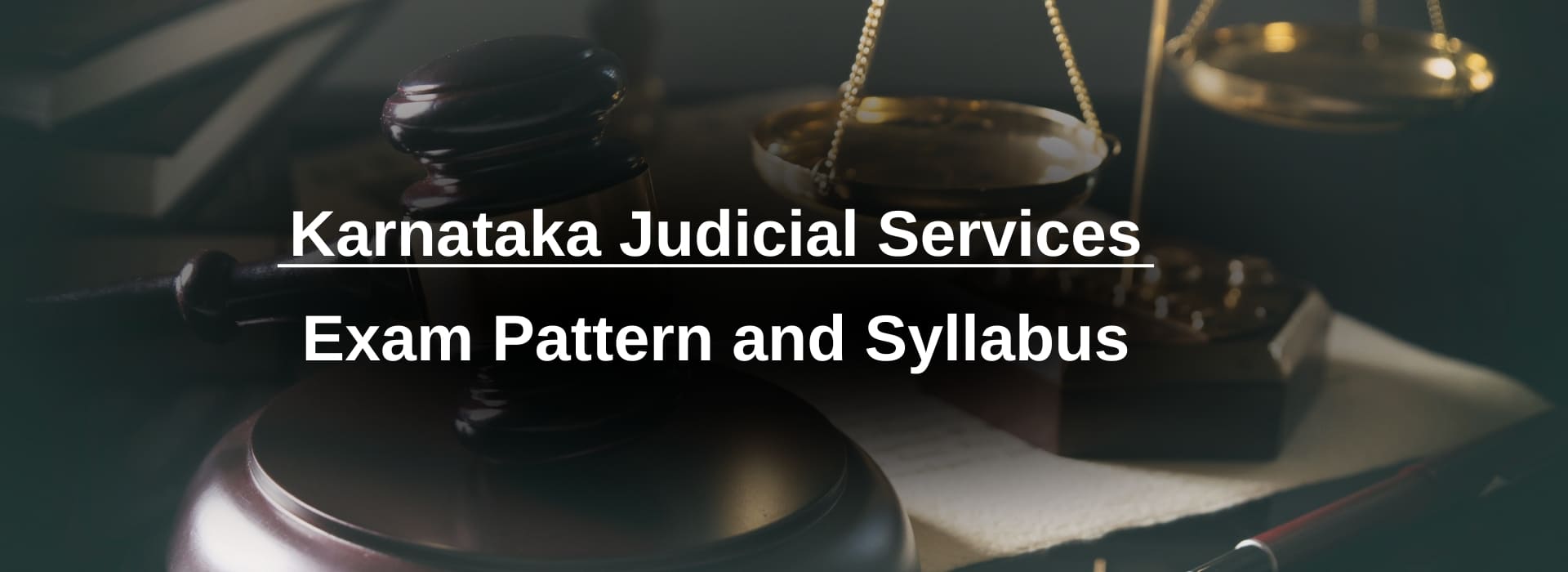
Karnataka Judiciary Syllabus 2024: Prelims and Mains
The Karnataka Judiciary Syllabus for both the Prelims and Mains exams is explained in detail in this article. If you're interested in applying, make sure to read through it carefully.
Every year, the Karnataka High Court conducts a recruitment process to fill judicial positions. In 2024, they will soon release details about the recruitment. The selection process includes a preliminary exam, a main exam, and an interview. To do well, you must be familiar with the Karnataka Judiciary Syllabus and exam structure, which we’ve outlined below.
Karnataka Judiciary Exam 2024 Overview
The Karnataka State Judiciary runs the Karnataka Judicial Services Exam to recruit civil judges in the state. This exam happens in several stages and is open to law graduates who meet the eligibility criteria set by the Karnataka High Court.
Here’s a quick look at the process for the Karnataka Judicial Services Exam:
Karnataka Judiciary Exam Pattern 2024
The Karnataka Judiciary Exam generally has three stages: Preliminary Exam, Main Exam, and Interview (Viva Voce). Here's a basic outline of the exam pattern:
1. Preliminary Exam
- Objective questions (Multiple Choice Questions or MCQs) are asked.
- Subjects may include the Indian Constitution, Civil Procedure Code, Criminal Procedure Code, Evidence Act, Contract Act, etc.
- The number of questions and marks can vary.
- There may be negative marking for incorrect answers.
- The Preliminary Exam is used to shortlist candidates for the Main Exam.
2. Main Exam
- Descriptive (essay-based) questions.
- The Main Exam tests the candidate’s knowledge in various legal subjects, like Civil Law, Criminal Law, Constitutional Law, and others.
- The number of papers and marks per paper can vary.
- This exam checks the depth of your legal knowledge and analytical skills.
3. Viva Voce (Interview)
- Candidates who pass the Main Exam are called for the interview.
- The interview tests the candidate’s personality, communication skills, legal knowledge, and understanding of legal principles.
- Senior judges and legal experts typically make up the interview panel.
- Your overall performance in the interview plays a role in the final selection.
Karnataka Judiciary Prelims Exam Pattern 2024
The Karnataka Judiciary Prelims Exam is for a total of 100 marks, with each question worth one mark. The exam lasts 2 hours. The questions will cover topics from Civil Law, Criminal Law, and General Knowledge, which includes Reasoning and Mental Ability.
Karnataka Judiciary Prelims Exam Pattern
| Subjects | Questions | Total Marks | Time |
|---|---|---|---|
| Part A – Civil Law | 100 | 100 | 2 Hours |
| Part B – Criminal Law | |||
| Part C – General Knowledge/Reasoning/Mental Ability |
Karnataka Judiciary Mains Exam Pattern 2024
The Karnataka Judiciary Mains Exam consists of descriptive papers, assessing the candidate’s understanding of various legal topics. The subjects usually include Civil Law, Criminal Law, Constitutional Law, and others.
The exam checks your overall legal knowledge, ability to think analytically, and how well you apply legal principles. This is an important stage, so it’s essential to prepare thoroughly.
Karnataka Judiciary Mains Exam Pattern
| Subjects | Total Marks |
|---|---|
| Part A – Civil Law | 150 |
| Part B – Criminal Law |
Karnataka Judiciary Syllabus for Prelims, Mains & Interview
The Karnataka Judiciary Syllabus covers a wide variety of legal subjects. Some of the main subjects include Civil Law, Criminal Law, Constitutional Law, Evidence, Contract Law, Family Law, Property Law, Administrative Law, and General Knowledge.
You’ll need to have a good understanding of these subjects, including their basic principles, provisions, and case laws. The syllabus also covers current affairs, reasoning, and mental ability.
Karnataka Judiciary Prelims Syllabus
The Prelims exam usually includes subjects related to law and general knowledge. Here are the main topics typically included in the Prelims syllabus:
- Indian Constitution
- Code of Civil Procedure
- Code of Criminal Procedure
- Indian Penal Code
- Indian Evidence Act
- Contract Act
- Specific Relief Act
- Transfer of Property Act
- Limitation Act
- Legal Reasoning and Aptitude
- General Knowledge and Current Affairs
- Reasoning and Mental Ability
Karnataka Judiciary Mains Syllabus 2024
The Mains exam usually has a Translation Paper and several Law Papers. These papers include topics like Civil Procedure Code, Criminal Procedure Code, Evidence Act, and other core areas of law.
Karnataka Judiciary Mains Syllabus
| Sections | Syllabus |
|---|---|
| Translation Paper | Translate passages from English to Kannada and vice versa. Passages from depositions, judgments, and legal documents. |
| Law Paper – I | The Code of Civil Procedure, 1908; The Code of Criminal Procedure, 1973; The Indian Evidence Act, 1872; Principles of Pleading; Constitution of India. |
| Law Paper – II | Framing of Issues and Writing Judgments in Civil Cases. |
| Law Paper – III | Framing Charges and Writing Judgments in Criminal Cases. |
Karnataka Judiciary Interview
The Karnataka Judiciary Interview, or Viva Voce, is the final stage of the selection process. If you pass the Mains Exam, you’ll be shortlisted for the interview.
The interview assesses your personality, communication skills, legal understanding, and problem-solving abilities. The panel usually includes senior judges and legal experts.
To do well, you should review important legal concepts, stay updated on current legal issues, and practice mock interviews to boost your confidence and presentation skills.